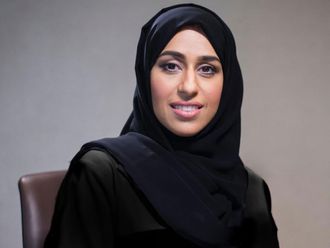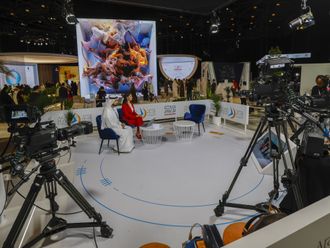Abu Dhabi: The UAE’s soft power and well-trained military can fill gaps in the United Nations peace-keeping missions around the world, a regional security conference was told Wednesday.
“A regional power such as the UAE has the capacity to fill gaps in the United nations peace-keeping missions around the world and especially in Syria,” Richard Gowan, associate director for Crisis Diplomacy and Peace Operations at the Centre on International Cooperation, New York University, US, told the Emirates Centre for Strategic Studies and Research’s 18th annual conference themed ‘The Future of Warfare in the 21st Century’.
Gowan added the UAE has a national interest in supporting the UN to help resolve the conflict in Syria.
“While there is no requirement for infantry, the UAE could play an extremely valuable role through providing fighter aircraft, special forces and technical support,” he said stressing that the assistance of the UAE would be very valuable and it need not fear being dragged into a long-term commitment.
He said the UN’s ongoing efforts to mediate a cease-fire in Syria had failed.
“It has struggled to manage the flow of refugees into Turkey, Lebanon and Jordan. Yet if or when Syrian President Bashar Al Assad falls; the UN may still play a major part in trying to stabilise the country.”
Officials in New York have completed contingency plans to deploy a new peace-keeping force, which would supposedly focus on observing any cease-fire, with a particular focus on the Syrian army.
It might also have to take responsibility for safeguarding Syria’s minorities. The inevitable reconstruction needs of post-conflict Syria will require the input of neighbouring powers. It is unlikely that the European powers will make a significant contribution.
Gowan said being an Arab, Muslim country, the UAE is also more acceptable than other European countries in many crisis areas such as Mali and Darfur.
He said the UAE military’s experience in Afghanistan were a valuable asset in conducting peacekeeping operations, which require the effective management of sophisticated military and development policies across a range of multi-national actors.
For all the flaws of multinational peacekeeping operations, they do usually work. UN interventions have stabilised Sierra Leone, Liberia and Haiti. Multilateral crisis management has done much to mitigate and resolve conflicts in many states around the world. The UN has played an important role in managing the difficult post-conflict situation in Libya after the fall of the Muammar Gaddafi regime. Peacekeeping forces will also be required in Somalia, both to contain the threat of piracy and to help with the reconstruction of the country.
Gowan said long-term geo-strategic trends will ensure that the UN and regional organisations will continue to play an important role.
“The reasons for this include: relative US disengagement and unwillingness to intervene in conflict situations; Nato’s decreased readiness — due largely to defence spending cuts — to intervene outside of Europe; humanitarian imperatives and the ‘responsibility to protect’; and the growth of regional organisations, such as the African Union and the Arab League. The future will see an increasingly complex inter-relation of regional and international organisations in the field of peace-keeping and post-conflict reconstruction.”












